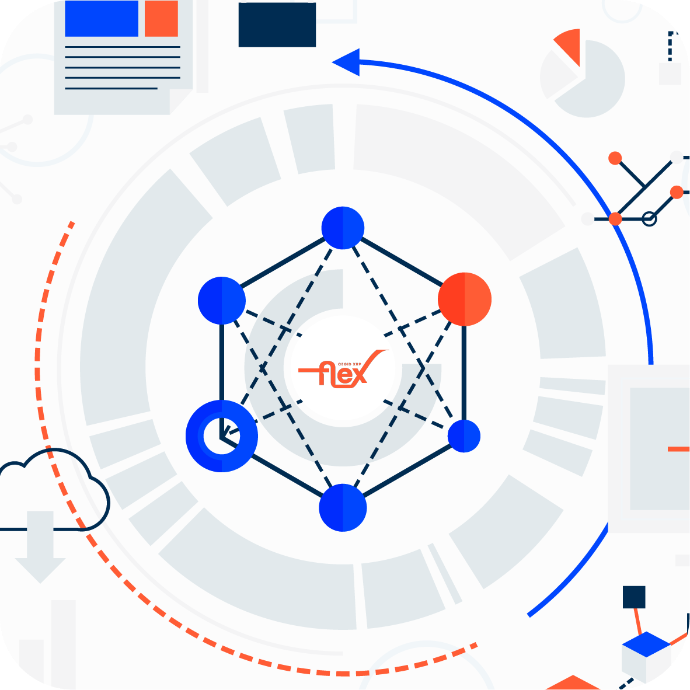Cegid XRP Flex, with its integrated BI, plays a pivotal role in fostering a data-driven culture within businesses. BI extends beyond mere data collection and analysis; it embodies a critical strategic approach for modern enterprises. Explore how Cegid XRP Flex promotes a data-driven culture through Business Intelligence by examining its influence on businesses and the benefits it offers.
What is Business Intelligence (BI)?
Business Intelligence (BI) refers to a set of technologies, processes, and tools aimed at collecting, organizing, analyzing, and presenting data to help businesses make better decisions. BI often focuses on feedback and analysis of historical data to provide relevant reports and insights to decision-makers. It can be seen as a more traditional and reactive approach to data analysis, centered on producing periodic reports and analyses to inform decisions.
Data-driven: An approach based on data
Data-driven emphasizes the continuous and real-time use of data to guide the strategic decisions and actions of the company. A data-driven approach integrates not only Business Intelligence but also other disciplines such as predictive analytics, machine learning, and artificial intelligence to leverage data proactively and iteratively. It seeks to fully harness the potential of data to anticipate trends, identify opportunities and risks, and optimize operations.
The difference between BI and data-driven approaches
Business Intelligence (BI) and Data-Driven are two related but distinct concepts in data analysis and decision-making. Here are the main differences:
Business Intelligence (BI)
- BI focuses on collecting, analyzing, and presenting data to assist businesses in making informed decisions.
- It typically involves the use of specific software and tools to extract data from various sources, transform it into actionable insights, and present it through reports, dashboards, or visualizations.
- BI often emphasizes retrospective analysis of a company's past performance and provides insights into historical trends.
Data-Driven
- Data-Driven approaches emphasize the continuous and real-time use of data to guide strategic decisions and actions within a company.
- It integrates various disciplines such as predictive analytics, machine learning, and artificial intelligence to proactively and iteratively leverage data.
- Data-Driven approaches seek to fully harness the potential of data to anticipate trends, identify opportunities and risks, and optimize operations.
In essence, while BI focuses on retrospective analysis and reporting, Data-Driven approaches are more forward-looking and proactive, leveraging data in real-time to drive strategic decisions.

How Business Intelligence can influence the development of a data-driven culture ?
A company can use data to determine the best location for a new store, identify new markets to explore, or adapt its product strategy to the changing needs of consumers. The data-driven approach enables businesses to make decisions based on data rather than biases or assumptions.
It's a method that fully integrates Data Analytics. By following such a strategy, companies can enhance their understanding of the market, anticipate trends, mitigate risks, and improve their customer relationships, all while adding a greater level of Business Intelligence (BI). BI can play a crucial role in developing a data-driven culture within an organization in several ways.
- Decision-making: BI provides accurate data and relevant analyses to decision-makers, enabling them to make informed decisions based on facts rather than intuition or assumptions. By encouraging the use of data in the decision-making process, BI helps foster a culture where decisions are guided by tangible data rather than personal opinions.
- Transparency and data sharing: BI promotes transparency by providing easy and secure access to relevant data across the organization. By making data accessible at all levels, BI fosters collaboration and knowledge sharing, reinforcing a culture where data is seen as a shared asset to be leveraged to achieve organizational goals.
- Empowerment: By implementing key performance indicators (KPIs) and tracking dashboards, BI enables transparent measurement and monitoring of performance. This fosters a culture of accountability where members of the organization are held responsible for their performance and are incentivized to improve their results by relying on available data.
- Continuous learning: BI encourages continuous learning by providing analyses of past and current trends and forecasts for the future. By examining data and drawing insights from past successes and failures, members of the organization can continually adapt and improve their methods, contributing to a culture of continuous improvement based on data.
Leveraging the integrated Business Intelligence in your Cegid XRP Flex ERP for a data-driven culture
Leveraging the Business Intelligence integrated into your ERP Cegid XRP Flex to foster a data-driven culture involves several aspects:
- Training and Awareness: Ensure that users within your organization understand the Business Intelligence capabilities of Cegid XRP Flex and how they can be utilized to make informed, data-driven decisions.
- Dashboard Customization: Utilize the dashboard customization features of Cegid XRP Flex to create specific views tailored to the needs of each user or team, highlighting relevant KPIs and important data.
- Data Access and Sharing: Ensure that relevant data is accessible to all authorized users and facilitate the sharing of information between departments to promote collaboration.
- Utilize Predictive Analytics : Use the predictive analytics capabilities of Cegid XRP Flex to anticipate future trends and make proactive decisions based on these insights.
- Report Automation: Set up automated reports in Cegid XRP Flex to regularly provide updates on company performance, allowing users to stay informed in real-time.
- Continuous Evaluation: Regularly assess the effectiveness of utilizing Cegid XRP Flex's Business Intelligence to identify opportunities for improvement and adjust strategies accordingly.
By implementing these measures, you can fully leverage the Business Intelligence integrated into your Cegid XRP Flex ERP to promote a data-driven culture within your organization.

Conclusion
By leveraging the Business Intelligence integrated into Cegid XRP Flex, companies can create a robust and dynamic data-driven culture. BI, by providing accurate, transparent, and accessible data, helps organizations make informed decisions, empower their members, foster continuous learning, and improve performance iteratively. With Cegid XRP Flex, businesses have a powerful tool to promote a culture where data is valued and used to achieve strategic goals with confidence and agility.
Improve your data management by using Cegid XRP Flex with Captivea
Captivea, as leader of Odoo implementation worldwide is the best Odoo and Cegid partner that you can choose!
Don't hesitate to contact us!






